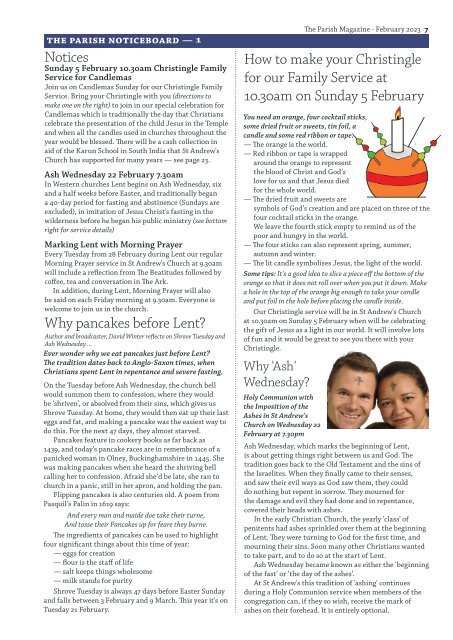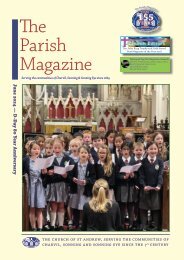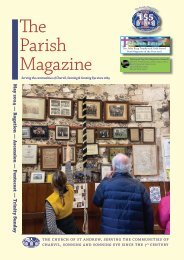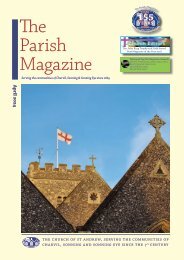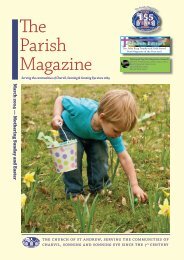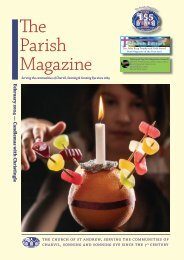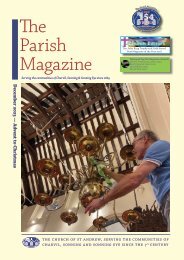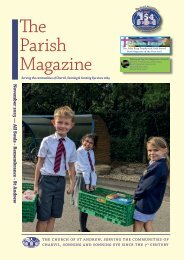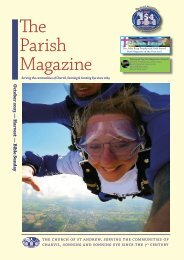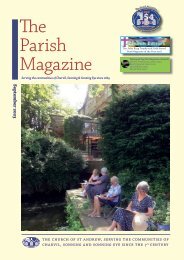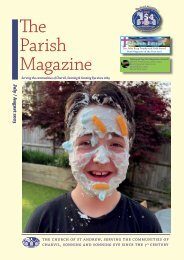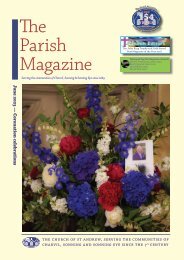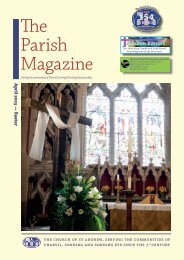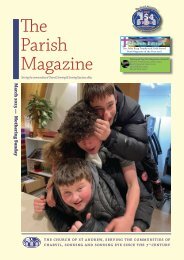The Parish Magazine February 2023
Serving the communities of Charvil, Sonning and Sonning Eye since 1869
Serving the communities of Charvil, Sonning and Sonning Eye since 1869
Create successful ePaper yourself
Turn your PDF publications into a flip-book with our unique Google optimized e-Paper software.
the parish noticeboard — 1<br />
Notices<br />
Sunday 5 <strong>February</strong> 10.30am Christingle Family<br />
Service for Candlemas<br />
Join us on Candlemas Sunday for our Christingle Family<br />
Service. Bring your Christingle with you (directions to<br />
make one on the right) to join in our special celebration for<br />
Candlemas which is traditionally the day that Christians<br />
celebrate the presentation of the child Jesus in the Temple<br />
and when all the candles used in churches throughout the<br />
year would be blessed. <strong>The</strong>re will be a cash collection in<br />
aid of the Karun School in South India that St Andrew's<br />
Church has supported for many years — see page 23.<br />
Ash Wednesday 22 <strong>February</strong> 7.30am<br />
In Western churches Lent begins on Ash Wednesday, six<br />
and a half weeks before Easter, and traditionally began<br />
a 40-day period for fasting and abstinence (Sundays are<br />
excluded), in imitation of Jesus Christ's fasting in the<br />
wilderness before he began his public ministry (see bottom<br />
right for service details)<br />
Marking Lent with Morning Prayer<br />
Every Tuesday from 28 <strong>February</strong> during Lent our regular<br />
Morning Prayer service in St Andrew's Church at 9.30am<br />
will include a reflection from <strong>The</strong> Beatitudes followed by<br />
coffee, tea and conversation in <strong>The</strong> Ark.<br />
In addition, during Lent, Morning Prayer will also<br />
be said on each Friday morning at 9.30am. Everyone is<br />
welcome to join us in the church.<br />
Why pancakes before Lent?<br />
Author and broadcaster, David Winter reflects on Shrove Tuesday and<br />
Ash Wednesday ...<br />
Ever wonder why we eat pancakes just before Lent?<br />
<strong>The</strong> tradition dates back to Anglo-Saxon times, when<br />
Christians spent Lent in repentance and severe fasting.<br />
On the Tuesday before Ash Wednesday, the church bell<br />
would summon them to confession, where they would<br />
be ‘shriven’, or absolved from their sins, which gives us<br />
Shrove Tuesday. At home, they would then eat up their last<br />
eggs and fat, and making a pancake was the easiest way to<br />
do this. For the next 47 days, they almost starved.<br />
Pancakes feature in cookery books as far back as<br />
1439, and today’s pancake races are in remembrance of a<br />
panicked woman in Olney, Buckinghamshire in 1445. She<br />
was making pancakes when she heard the shriving bell<br />
calling her to confession. Afraid she’d be late, she ran to<br />
church in a panic, still in her apron, and holding the pan.<br />
Flipping pancakes is also centuries old. A poem from<br />
Pasquil’s Palin in 1619 says:<br />
And every man and maide doe take their turne,<br />
And tosse their Pancakes up for feare they burne.<br />
<strong>The</strong> ingredients of pancakes can be used to highlight<br />
four significant things about this time of year:<br />
— eggs for creation<br />
— flour is the staff of life<br />
— salt keeps things wholesome<br />
— milk stands for purity<br />
Shrove Tuesday is always 47 days before Easter Sunday<br />
and falls between 3 <strong>February</strong> and 9 March. This year it's on<br />
Tuesday 21 <strong>February</strong>.<br />
<strong>The</strong> <strong>Parish</strong> <strong>Magazine</strong> - <strong>February</strong> <strong>2023</strong> 7<br />
How to make your Christingle<br />
for our Family Service at<br />
10.30am 0n Sunday 5 <strong>February</strong><br />
You need an orange, four cocktail sticks,<br />
some dried fruit or sweets, tin foil, a<br />
candle and some red ribbon or tape.<br />
— <strong>The</strong> orange is the world.<br />
— Red ribbon or tape is wrapped<br />
around the orange to represent<br />
the blood of Christ and God’s<br />
love for us and that Jesus died<br />
for the whole world.<br />
— <strong>The</strong> dried fruit and sweets are<br />
symbols of God’s creation and are placed on three of the<br />
four cocktail sticks in the orange.<br />
We leave the fourth stick empty to remind us of the<br />
poor and hungry in the world.<br />
— <strong>The</strong> four sticks can also represent spring, summer,<br />
autumn and winter.<br />
— <strong>The</strong> lit candle symbolises Jesus, the light of the world.<br />
Some tips: It's a good idea to slice a piece off the bottom of the<br />
orange so that it does not roll over when you put it down. Make<br />
a hole in the top of the orange big enough to take your candle<br />
and put foil in the hole before placing the candle inside.<br />
Our Christingle service will be in St Andrew's Church<br />
at 10.30am on Sunday 5 <strong>February</strong> when will be celebrating<br />
the gift of Jesus as a light in our world. It will involve lots<br />
of fun and it would be great to see you there with your<br />
Christingle.<br />
Why 'Ash'<br />
Wednesday?<br />
Holy Communion with<br />
the Imposition of the<br />
Ashes in St Andrew's<br />
Church on Wednesday 22<br />
<strong>February</strong> at 7.30pm<br />
Ash Wednesday, which marks the beginning of Lent,<br />
is about getting things right between us and God. <strong>The</strong><br />
tradition goes back to the Old Testament and the sins of<br />
the Israelites. When they finally came to their senses,<br />
and saw their evil ways as God saw them, they could<br />
do nothing but repent in sorrow. <strong>The</strong>y mourned for<br />
the damage and evil they had done and in repentance,<br />
covered their heads with ashes.<br />
In the early Christian Church, the yearly 'class' of<br />
penitents had ashes sprinkled over them at the beginning<br />
of Lent. <strong>The</strong>y were turning to God for the first time, and<br />
mourning their sins. Soon many other Christians wanted<br />
to take part, and to do so at the start of Lent.<br />
Ash Wednesday became known as either the 'beginning<br />
of the fast' or ‘the day of the ashes’.<br />
At St Andrew's this tradition of 'ashing' continues<br />
during a Holy Communion service when members of the<br />
congregation can, if they so wish, receive the mark of<br />
ashes on their forehead. It is entirely optional.


